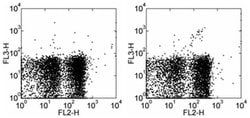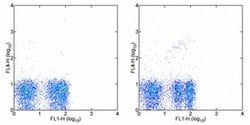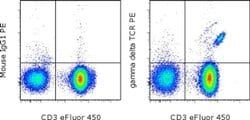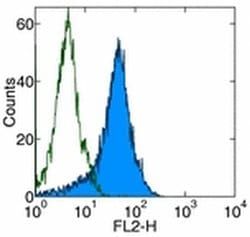50-119-34
TCR gamma/delta Monoclonal Antibody (UC7-13D5), Biotin, eBioscience™, Invitrogen™
Manufacturer: Fischer Scientific
Select a Size
| Pack Size | SKU | Availability | Price |
|---|---|---|---|
| Each of 1 | 50-119-34-Each-of-1 | In Stock | ₹ 15,664.00 |
50-119-34 - Each of 1
In Stock
Quantity
1
Base Price: ₹ 15,664.00
GST (18%): ₹ 2,819.52
Total Price: ₹ 18,483.52
Antigen
TCR gamma/delta
Classification
Monoclonal
Concentration
0.5 mg/mL
Formulation
PBS with 0.09% sodium azide; pH 7.2
Gene Accession No.
0
Gene Symbols
Tcrd, Tcrg
Purification Method
Affinity chromatography
Regulatory Status
RUO
Gene ID (Entrez)
110066, 110067
Content And Storage
4° C, store in dark, DO NOT FREEZE!
Form
Liquid
Applications
Flow Cytometry
Clone
UC7-13D5
Conjugate
Biotin
Gene
Tcrd
Gene Alias
RGD1311300; similar to T cell receptor V delta 6; T cell receptor gamma locus; T3/TCR complex; TCR delta gamma; TCR gamma/delta; TCR-CD3 complex; Tcrg; Trg; Trg@
Host Species
Armenian Hamster
Quantity
100 μg
Primary or Secondary
Primary
Target Species
Mouse
Product Type
Antibody
Isotype
IgG
Related Products
Description
- Description: The UC7-13D5 monoclonal antibody reacts with the mouse gammadelta TCR complex
- gammadelta TCR is expressed by a small subset of T cells in the thymus, peripheral lymphoid tissues, intestinal epithelium, and epidermis
- The exact specificity, ligand and function of gammadelta TCR-bearing T cells are not yet fully understood; it is suggested that these cells recognize bacterial ligands and some tumor cells in the context of MHC class I-like gene products and play a role in regulation of the immune response and during bacterial infection
- Applications Reported: UC7-13D5 has been reported for use as a phenotypic marker for gamma delta TCR-expressing T cells in flow cytometric analysis
- Applications Tested: The UC7-13D5 antibody has been tested by flow cytometric analysis of mouse thymocytes and splenocytes and can be used at less than or equal to 0.5 μg per test
- A test is defined as the amount (μg) of antibody that will stain a cell sample in a final volume of 100 μL
- Cell number should be determined empirically but can range from 10^5 to 10^8 cells/test
- It is recommended that the antibody be carefully titrated for optimal performance in the assay of interest
- Filtration: 0.2 μm post-manufacturing filtered
- TCR gamma/delta (T-cell receptor gamma/delta) are specialized T-cells in the immune system
- The ability of T cell receptors (TCR) to discriminate foreign from self-peptides presented by major histocompatibility complex (MHC) class II molecules is essential for an effective adaptive immune response
- TCR recognition of self-peptides has been linked to autoimmune disease
- Mutant self-peptides have been associated with tumors
- Engagement of TCRs by a family of bacterial toxins know as superantigens has been responsible for toxic shock syndrome
- Autoantibodies to V beta segments of T cell receptors have been isolated from patients with rheumatoid arthritis (RA) and systemic lupus erythematosus (SLE)
- The autoantibodies block TH1-mediated inflammatory auto-destructive reactions and are believed to be a method by which the immune system compensates for disease
- Most human T cells express the TCR alpha-beta and either CD4 or CD8 molecule (single positive, SP)
- However, a small number of T cells lack both CD4 and CD8 (double negative, DN)
- Increased percentages of alpha-beta DN T cells have been identified in some autoimmune and immunodeficiency disorders
- Gamma-delta T cells are primarily found within the epithelium
- They show less TCR diversity and recognize antigens differently than alpha-beta T cells
- Subsets of gamma-delta T cells have shown antitumor and immunoregulatory activity.
Compare Similar Items
Show Difference
Antigen: TCR gamma/delta
Classification: Monoclonal
Concentration: 0.5 mg/mL
Formulation: PBS with 0.09% sodium azide; pH 7.2
Gene Accession No.: 0
Gene Symbols: Tcrd, Tcrg
Purification Method: Affinity chromatography
Regulatory Status: RUO
Gene ID (Entrez): 110066, 110067
Content And Storage: 4° C, store in dark, DO NOT FREEZE!
Form: Liquid
Applications: Flow Cytometry
Clone: UC7-13D5
Conjugate: Biotin
Gene: Tcrd
Gene Alias: RGD1311300; similar to T cell receptor V delta 6; T cell receptor gamma locus; T3/TCR complex; TCR delta gamma; TCR gamma/delta; TCR-CD3 complex; Tcrg; Trg; Trg@
Host Species: Armenian Hamster
Quantity: 100 μg
Primary or Secondary: Primary
Target Species: Mouse
Product Type: Antibody
Isotype: IgG
Antigen:
TCR gamma/delta
Classification:
Monoclonal
Concentration:
0.5 mg/mL
Formulation:
PBS with 0.09% sodium azide; pH 7.2
Gene Accession No.:
0
Gene Symbols:
Tcrd, Tcrg
Purification Method:
Affinity chromatography
Regulatory Status:
RUO
Gene ID (Entrez):
110066, 110067
Content And Storage:
4° C, store in dark, DO NOT FREEZE!
Form:
Liquid
Applications:
Flow Cytometry
Clone:
UC7-13D5
Conjugate:
Biotin
Gene:
Tcrd
Gene Alias:
RGD1311300; similar to T cell receptor V delta 6; T cell receptor gamma locus; T3/TCR complex; TCR delta gamma; TCR gamma/delta; TCR-CD3 complex; Tcrg; Trg; Trg@
Host Species:
Armenian Hamster
Quantity:
100 μg
Primary or Secondary:
Primary
Target Species:
Mouse
Product Type:
Antibody
Isotype:
IgG
Antigen: TCR gamma/delta
Classification: Monoclonal
Concentration: 0.5 mg/mL
Formulation: PBS with 0.09% sodium azide; pH 7.2
Gene Accession No.: 0
Gene Symbols: Tcrd, Tcrg
Purification Method: Affinity chromatography
Regulatory Status: RUO
Gene ID (Entrez): 110066, 110067
Content And Storage: 4° C, store in dark, DO NOT FREEZE!
Form: Liquid
Applications: Flow Cytometry
Clone: UC7-13D5
Conjugate: Biotin
Gene: Tcrg
Gene Alias: RGD1311300; similar to T cell receptor V delta 6; T cell receptor gamma locus; T3/TCR complex; TCR delta gamma; TCR gamma/delta; TCR-CD3 complex; Tcrg; Trg; Trg@
Host Species: Armenian Hamster
Quantity: 500 μg
Primary or Secondary: Primary
Target Species: Mouse
Product Type: Antibody
Isotype: IgG
Antigen:
TCR gamma/delta
Classification:
Monoclonal
Concentration:
0.5 mg/mL
Formulation:
PBS with 0.09% sodium azide; pH 7.2
Gene Accession No.:
0
Gene Symbols:
Tcrd, Tcrg
Purification Method:
Affinity chromatography
Regulatory Status:
RUO
Gene ID (Entrez):
110066, 110067
Content And Storage:
4° C, store in dark, DO NOT FREEZE!
Form:
Liquid
Applications:
Flow Cytometry
Clone:
UC7-13D5
Conjugate:
Biotin
Gene:
Tcrg
Gene Alias:
RGD1311300; similar to T cell receptor V delta 6; T cell receptor gamma locus; T3/TCR complex; TCR delta gamma; TCR gamma/delta; TCR-CD3 complex; Tcrg; Trg; Trg@
Host Species:
Armenian Hamster
Quantity:
500 μg
Primary or Secondary:
Primary
Target Species:
Mouse
Product Type:
Antibody
Isotype:
IgG
Antigen: __
Classification: __
Concentration: __
Formulation: __
Gene Accession No.: __
Gene Symbols: __
Purification Method: __
Regulatory Status: __
Gene ID (Entrez): __
Content And Storage: __
Form: __
Applications: __
Clone: __
Conjugate: __
Gene: __
Gene Alias: __
Host Species: __
Quantity: __
Primary or Secondary: __
Target Species: __
Product Type: __
Isotype: __
Antigen:
__
Classification:
__
Concentration:
__
Formulation:
__
Gene Accession No.:
__
Gene Symbols:
__
Purification Method:
__
Regulatory Status:
__
Gene ID (Entrez):
__
Content And Storage:
__
Form:
__
Applications:
__
Clone:
__
Conjugate:
__
Gene:
__
Gene Alias:
__
Host Species:
__
Quantity:
__
Primary or Secondary:
__
Target Species:
__
Product Type:
__
Isotype:
__
Antigen: CD309 (FLK1)
Classification: Monoclonal
Concentration: 0.5 mg/mL
Formulation: PBS with 0.09% sodium azide; pH 7.2
Gene Accession No.: P35918
Gene Symbols: KDR
Purification Method: Affinity chromatography
Regulatory Status: RUO
Gene ID (Entrez): 16542
Content And Storage: 4° C, store in dark, DO NOT FREEZE!
Form: Liquid
Applications: Flow Cytometry
Clone: Avas12a1
Conjugate: Biotin
Gene: KDR
Gene Alias: 6130401C07; CD309; CD309 antigen; fetal liver kinase 1; fetal liver kinase-1; FLK1; Flk-1; FLK1 kinase insert domain receptor (a type III receptor tyrosine kinase) (VEGF receptor 2); FLK1 kinase insert domain receptor (VEGF receptor 2); flk-1 type VEGF receptor; KDR; kinase insert domain protein receptor; kinase insert domain receptor; kinase insert domain receptor (a type III receptor tyrosine kinase); kinase NYK; Krd-1; Ly73; protein-tyrosine kinase receptor flk-1; sCD309; soluble CD309; soluble vascular endothelial growth factor receptor 2; soluble VEGFR 2; soluble VEGFR2; sVEGFR-2; tyrosine kinase growth factor receptor; vascular endotheial growth factor 2; vascular endothelial growth factor receptor 2; vascular endothelial growth factor receptor- 2; vascular endothelial growth factor receptor-2; vascular endothelial growth factor receptor-3; VEGF R2; VEGF receptor-2; VEGFR; VEGFR2; VEGFR-2
Host Species: Rat
Quantity: 100 μg
Primary or Secondary: Primary
Target Species: Mouse
Product Type: Antibody
Isotype: IgG2a κ
Antigen:
CD309 (FLK1)
Classification:
Monoclonal
Concentration:
0.5 mg/mL
Formulation:
PBS with 0.09% sodium azide; pH 7.2
Gene Accession No.:
P35918
Gene Symbols:
KDR
Purification Method:
Affinity chromatography
Regulatory Status:
RUO
Gene ID (Entrez):
16542
Content And Storage:
4° C, store in dark, DO NOT FREEZE!
Form:
Liquid
Applications:
Flow Cytometry
Clone:
Avas12a1
Conjugate:
Biotin
Gene:
KDR
Gene Alias:
6130401C07; CD309; CD309 antigen; fetal liver kinase 1; fetal liver kinase-1; FLK1; Flk-1; FLK1 kinase insert domain receptor (a type III receptor tyrosine kinase) (VEGF receptor 2); FLK1 kinase insert domain receptor (VEGF receptor 2); flk-1 type VEGF receptor; KDR; kinase insert domain protein receptor; kinase insert domain receptor; kinase insert domain receptor (a type III receptor tyrosine kinase); kinase NYK; Krd-1; Ly73; protein-tyrosine kinase receptor flk-1; sCD309; soluble CD309; soluble vascular endothelial growth factor receptor 2; soluble VEGFR 2; soluble VEGFR2; sVEGFR-2; tyrosine kinase growth factor receptor; vascular endotheial growth factor 2; vascular endothelial growth factor receptor 2; vascular endothelial growth factor receptor- 2; vascular endothelial growth factor receptor-2; vascular endothelial growth factor receptor-3; VEGF R2; VEGF receptor-2; VEGFR; VEGFR2; VEGFR-2
Host Species:
Rat
Quantity:
100 μg
Primary or Secondary:
Primary
Target Species:
Mouse
Product Type:
Antibody
Isotype:
IgG2a κ






